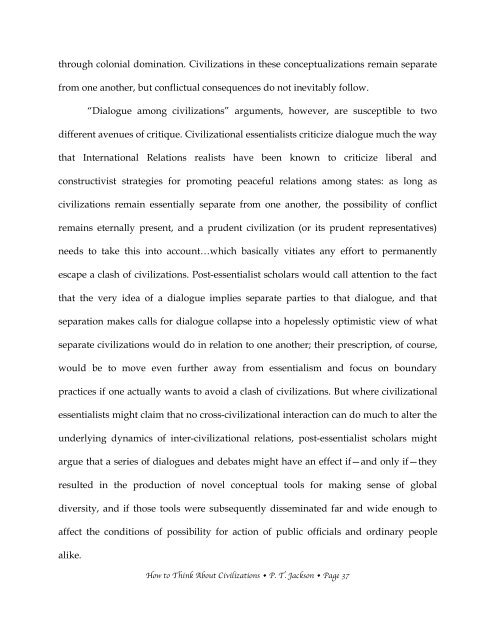How to Think About Civilizations - The Watson Institute for ...
How to Think About Civilizations - The Watson Institute for ...
How to Think About Civilizations - The Watson Institute for ...
Create successful ePaper yourself
Turn your PDF publications into a flip-book with our unique Google optimized e-Paper software.
through colonial domination. <strong>Civilizations</strong> in these conceptualizations remain separate<br />
from one another, but conflictual consequences do not inevitably follow.<br />
“Dialogue among civilizations” arguments, however, are susceptible <strong>to</strong> two<br />
different avenues of critique. Civilizational essentialists criticize dialogue much the way<br />
that International Relations realists have been known <strong>to</strong> criticize liberal and<br />
constructivist strategies <strong>for</strong> promoting peaceful relations among states: as long as<br />
civilizations remain essentially separate from one another, the possibility of conflict<br />
remains eternally present, and a prudent civilization (or its prudent representatives)<br />
needs <strong>to</strong> take this in<strong>to</strong> account…which basically vitiates any ef<strong>for</strong>t <strong>to</strong> permanently<br />
escape a clash of civilizations. Post-essentialist scholars would call attention <strong>to</strong> the fact<br />
that the very idea of a dialogue implies separate parties <strong>to</strong> that dialogue, and that<br />
separation makes calls <strong>for</strong> dialogue collapse in<strong>to</strong> a hopelessly optimistic view of what<br />
separate civilizations would do in relation <strong>to</strong> one another; their prescription, of course,<br />
would be <strong>to</strong> move even further away from essentialism and focus on boundary<br />
practices if one actually wants <strong>to</strong> avoid a clash of civilizations. But where civilizational<br />
essentialists might claim that no cross-civilizational interaction can do much <strong>to</strong> alter the<br />
underlying dynamics of inter-civilizational relations, post-essentialist scholars might<br />
argue that a series of dialogues and debates might have an effect if—and only if—they<br />
resulted in the production of novel conceptual <strong>to</strong>ols <strong>for</strong> making sense of global<br />
diversity, and if those <strong>to</strong>ols were subsequently disseminated far and wide enough <strong>to</strong><br />
affect the conditions of possibility <strong>for</strong> action of public officials and ordinary people<br />
alike.<br />
<strong>How</strong> <strong>to</strong> <strong>Think</strong> <strong>About</strong> <strong>Civilizations</strong> • P. T. Jackson • Page 37
















